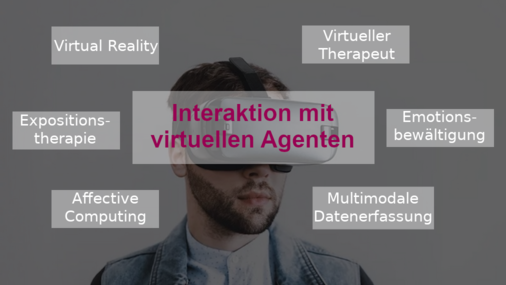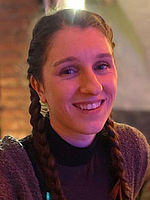
Interaction with Virtual Agents

Task-Based Information Behavior at Transitional Spaces
Overview
Where to Go and What to Do: Towards Understanding Task-Based Information Behavior at Transitional Spaces
In public transitional spaces, such as airports, users are faced with diverse challenges regarding information interaction and use. These challenges arise due to the scheduled and/or location-dependent procedures users are required to perform. Understanding what these users need or desire in the context of such spaces, what information is on offer, both online and in situ, and how these aspects interrelate is important to facilitate the design of systems that are accepted by the users concerned. However, very little is known about human information behavior (HIB) in public transitional spaces. As a starting point to understand how behavior in such spaces relates to or differs from information behavior in other contexts, holistically, I will create an explanatory model of airport information behavior by conducting an exploratory grounded theory based field study and relating my findings to those of existing models.
(from: Melanie A. Kilian. 2019. Where to Go and What to Do: Towards Understanding Task-Based Information Behavior at Transitional Spaces. In 2019 Conference on Human Information Interaction and Retrieval (CHIIR ’19), March 10–14, 2019, Glasgow, Scotland Uk. ACM, New York, NY, USA, 4 pages. doi.org/10.1145/3295750.3298972)
Publications
Melanie A. Kilian (2019). Where to Go and What to Do: Towards Understanding Task-Based Information Behavior at Transitional Spaces. In 2019 Conference on Human Information Interaction and Retrieval (CHIIR ’19), March 10–14, 2019, Glasgow, Scotland Uk. ACM, New York, NY, USA, 4 pages. doi.org/10.1145/3295750.3298972
Funding & Collaboration

Team
|
(Information Science, UR) |
(Information Science, UR) |
|
(Information Science, UR) |
Contact
Information Needs in Natural Language Dialogues
Overview
Information Needs in Natural Language Dialogues
As conversational search becomes more pervasive, it becomes increasingly important to understand the users' underlying needs when they converse with such systems in diverse contexts. The aim of this project is to improve information need detection. In the long term, this will help improving conversation between user and system, because the system gains a better understanding of what the user wants when it is able to detect the user’s information needs. For this purpose, we have chosen the food domain as area of interest.
Literature
Radlinski, F. & Craswell, N. (2017). A Theoretical Framework for Conversational Search. In Proceedings of the 2017 Conference on Conference Human Information Interaction and Retrieval (S. 117-126). New York: ACM.
Shiga, S., Joho, H., Blanco, R., Trippas, J. R., & Sanderson, M. (2017). Modelling Information Needs in Collaborative Search Conversations. In Proceedings of the 40th International ACM SIGIR Conference on Research and Development in Information Retrieval (S. 715-724). New York: ACM.
Trippas, J. R., Sanderson, M., Spina, D., & Cavedon, L. (2015). Results Presentation Methods for a Spoken Conversational Search System. In Proceedings of the First International Workshop on Novel Web Search Interfaces and Systems (S. 13–15). New York: ACM.
Trippas, J. (2016). Spoken conversational search: speech-only interactive information retrieval. In Human Information Interaction and Retrieval (S. 373–375). New York: ACM.
Trippas, J. R., Spina, D., Cavedon, L., & Sanderson, M. (2017). How Do People Interact in Conversational Speech-Only Search Tasks: A Preliminary Analysis. In Proceedings of the 2017 Conference on Conference Human Information Interaction and Retrieval (S. 325-328). New York: ACM.
Trippas, J. R., Spina, D., Cavedon, L., Joho, H., & Sanderson, M. (2018). Informing the Design of Spoken Conversational Search. In. Proceedings of 2018 Conference on Human Information Interaction & Retrieval (S. 32 – 41). New York: ACM.
Team
| (Information Science, UR) |
(Information Science, UR) |
Contact
FoodChoice
Overview
Modelling & Changing Online Food Choices through Recommenders
Studying how people upload and browse online recipes has recently become an active field of research. While there is a growing body of work investigating which types of food are consumed and how this relates to real-world health related issues, such as e.g. diabetes or obesity, little research focus has yet been devoted to understanding how people make their food choices online, how they are influenced by certain contextual factors, how this behavior can be modelled or how this behavior can be changed. With respect to the last problem, recommender systems - such as those used by online stores to suggest products customers might like- are often touted as part of the solution. However, very little literature exists describing to which extent food preferences can be changed or the different effects different algorithmic approaches can have. In response we initiated a cross-border research project FoodChoice, which aims to not only to provide a better understanding regarding how certain factors, such as temporality, user geography and social relations between users influence the food choices people make online, but to moreover investigate how this behavior can be modelled and changed through novel health-aware recommender algorithms.
Publications
coming soon
Funding & Collaboration
Team
|
(Information Science, UR) |
(Information Science and Media Studies, |
|
(Information Science, UR) |
Contact
Cocktail-Mixer BORIS
Overview
BORIS - Bar Ordering and Information Systems
BORIS was first introduced at the CeBit 2006 and returned at CeBit 2014 with an improved system. BORIS recommends and prepares cocktails based on context. Furthermore the system is able to give individual advice and warnings on alcohol consumption. Several ingredients and cocktail flavours will be suggested after the user gave input about his current mood.
For this interaction with BORIS haptic and voice control is needed. Therefore as part of the BORIS project, a speech and touch based dialog and recommendation system was developed.
The system is getting continuously updated and further developed.
Team

(Information Science, UR)
Contact
URWalking
Overview
URWalking - University of Regensburg Walking
Do you remember the last time you had to ask for the way? Have you been told to turn right after 250 meters? Probably not because people normally tend to remember landmarks to find their way.
The tangled ways to get around campus can be used to test landmark-based pedestrian navigation systems. The URWalking project appeals widely to our students.
Two participations at CeBIT testify to the very personal course of the URWalking
project.
Promotion Materials
Team

(Information Science, UR)
Contact
WeightPal
Overview
The increasing rate of obesity in the German population calls for the development of new treatment options as a way to reduce costs on the public health care system and increase treatment success.
This project explores possibilities of automated empathetic conversation to support traditional obesity treatment. The constant availability of a conversational agent could solve problems related to weight loss as soon as they arise and help with impulse control. The non-judgemental nature of such a system as opposed to counsellors or peers has the potential to lower the user’s inhibitions and increase honesty in conversations about sensitive topics.
In the long term, such a conversational agent could be a valuable tool in the treatment and prevention of obesity.
Publications
Meyer, Selina, Elsweiler, David, Ludwig, Bernd (2020). Assessing the quality of weight loss information on the German language web, Movement and Nutrition in Health and Disease, Vol (4) 2020, DOI:10.5283/mnhd.26
Team
|
(Information Science, UR) |
(Information Science, UR) |
|
(Information Science, UR) |
Contact
- Fakultät für Sprach-, Literatur- und Kulturwissenschaften
- Institut für Information und Medien, Sprache und Kultur (I:IMSK)
Informationswissenschaft
Research Group
Interactions with Virtual Agents








